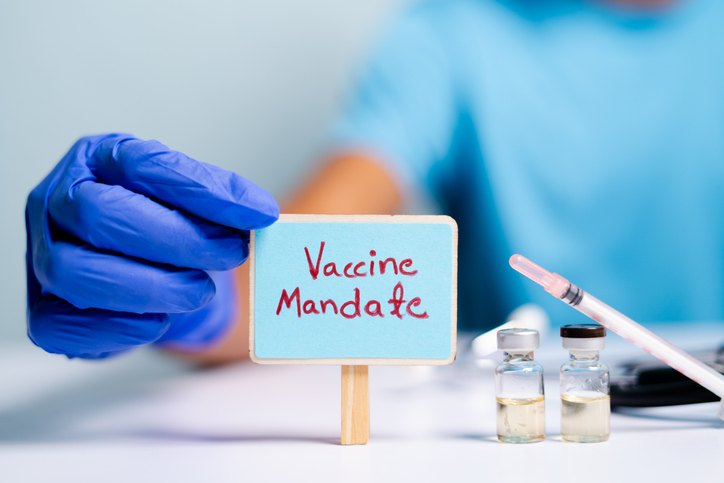Health care fraud enforcement remains a top priority of the Trump administration, warns a law firm specializing in False Claims Act and Whistleblower/Qui Tam Defense.
“All individuals and businesses working in any aspect of the health care field should pay close attention to the government’s planned use of data analytics to spot anomalous billing,” wrote Jonathan S. Ross on the website of law firm Maynard Nexsen on August 25.
The warning came after the Department of Justice, the U.S. Department of Health and Human Services Office of Inspector General (HHS-OIG), and other law enforcement agencies announced on June 30 criminal charges against 324 individuals who sought to bilk the U.S. health care system of $14.6 billion in total, discovered through a joint investigation.
The previous record for a “National Health Care Fraud Takedown” was $6 billion, HHS-OIG stated. “Takedowns” are government-wide enforcement actions that have been done annually in recent years, writes Ross.
HHS-OIG, DOJ, the FBI, and other federal agencies will be setting up a “Health Fraud Data Fusion Center” to expand the use of data analytics to detect fraud more quickly, DOJ said in its June 30 news release.
Patients Harmed
The indictments included 96 doctors, nurses, pharmacists, and other licensed professionals. The fraud cases spanned 50 federal districts and 12 state Attorneys General offices, making it the largest coordinated health-care fraud action in U.S. history.
“The Criminal Division is intensely committed to rooting out health care fraud schemes and prosecuting the criminals who perpetrate them because these schemes: (1) often result in physical patient harm through medically unnecessary treatments or failure to provide the correct treatments; (2) contribute to our nationwide opioid epidemic and exacerbate controlled substance addiction; and (3) do all of that while stealing money hardworking Americans contribute to pay for the care of their elders and other vulnerable citizens,” said Matthew R. Galeotti, head of the Justice Department’s Criminal Division, in the June 30 news release.
Authorities seized more than $245 million in cash, fancy cars, cryptocurrency, and other assets on June 30. The U.S. Centers for Medicare and Medicaid Services (CMS) said it blocked more than $4 billion in fraudulent claims before they were paid.
Transnational Crime Operation
One key scheme, known as “Operation Gold Rush,” involved a transnational criminal network that acquired U.S. medical-supply companies using foreign straw owners. Once in place, they used stolen identities and filed massive false claims for urinary catheters and other durable equipment.
Investigators used data analytics to detect billing anomalies.
Another scheme, in Arizona and Nevada, targeted elderly patients in hospice care. Medical companies applied “medically unnecessary” amniotic allografts to patients’ wounds.
Some operations involved opioids and illegal clinics. In one case, five defendants associated with a Texas drug store unlawfully distributed more than three million opioid pills, which were later sold by street-level drug dealers.
Investigators discovered fraudulent health claims for genetic testing and substance abuse treatment that were never given. In one scheme, a clinic with owners in Pakistan and the United Arab Emirates paid kickbacks to get patient referrals recruited from homeless populations and Native American reservations.
The indictments could also lead to seizure of property and civil lawsuits brought by individuals. Authorities have filed civil claims against some of the defendants, reaching $34.3 million in settlements so far.
‘Alien Thug-Parasites’
When more than a trillion dollars in federal taxpayer money props up health, disability, and welfare programs, it should not be any surprise that thieves view it as low-hanging fruit, says John Dale Dunn, M.D., a Texas physician, attorney, and policy advisor to The Heartland Institute.
“These alien thug-parasites are smart enough to know how to rip off America,” said Dunn. “They target housing, food, mental health, disability, and health care programs. Billions are billed as fake. The Department of Government Efficiency found it, and that’s invaluable work.”
Dunn recalls the infamous American bank robber Willie Sutton, who was asked why banks were his target: “Because that’s where the money is.”
Dunn says he blames bureaucratic indifference for the thefts.
“The bureaucracies of the health care/welfare state are populated by incompetent and lazy people,” said Dunn. “DOGE auditors found fraud by actually looking—auditing billing patterns, verifying identities, and matching claims to real services. Computers can do this easily.”
The indifference of huge bureaucracies invites cheating, Dunn says.
“Bureaucrats are careless with taxpayer money because it isn’t theirs, or they think it isn’t,” said Dunn. “That carelessness fuels the health care fraud crisis.”
Theft Invitation
U.S. crime families recognized years ago that Medicare and Medicaid were easy fraud targets, and it was only a matter of time before foreign cartels figured it out, says Merrill Matthews, Ph.D., a health care policy analyst and columnist for The Hill.
“Every administration claims it will crack down on Medicare and Medicaid fraud,” said Matthews, “but they barely scratch the surface. So, kudos to the Trump administration for going after the scammers. An aggressive, sustained effort could save taxpayers billions and eliminate one more reason for criminal gangs to infiltrate the country.”
Years ago, Medicare and Medicaid fraud schemes linked to the Mafia were a staple of investigations by CBS’s 60 Minutes news and commentary show, Matthews says.
“An HHS inspector general’s attorney told CBS at the time, ‘Building a Medicare fraud scam is far safer than dealing in crack or stolen cars, and it’s far more lucrative,’” said Matthews.
Kenneth Artz ([email protected]) writes from Tyler, Texas.





